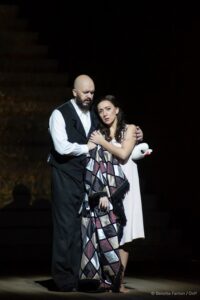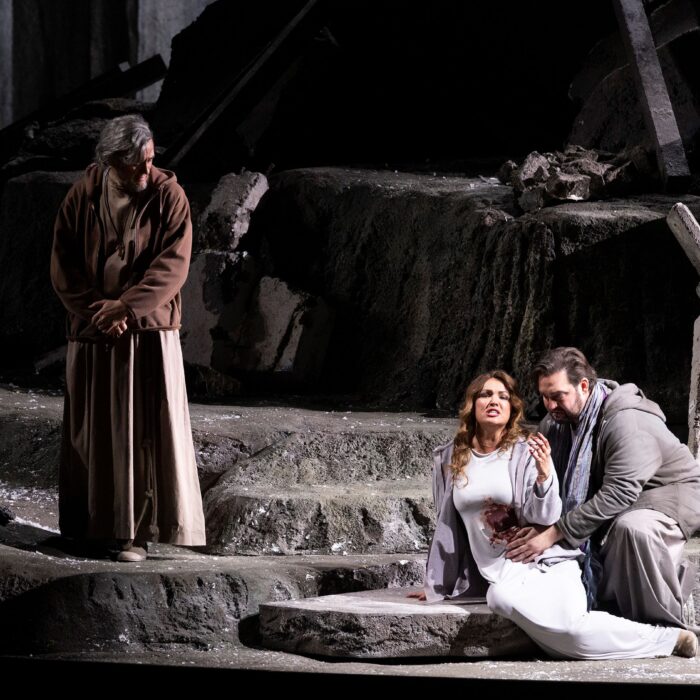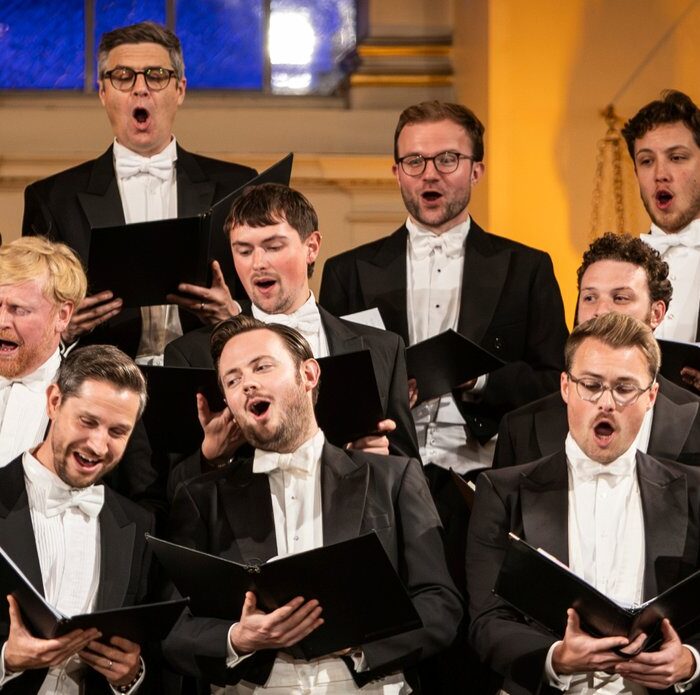
Opéra National de Paris 2024-25 Review: Rigoletto
Rosa Feola Saves the Day In Unfortunate ‘Rigoletto’ Production
By Francisco SalazarThis season the Paris Opera is reviving “Rigoletto” in Claus Guth’s 2016 stark production.
Verdi’s work is known for its memorable arias and melodies and is perhaps one of the most difficult works for baritone. It is also a gritty plot that has been reinterpreted in many different ways, sometimes revealing its darker layers. But in other instances, reinterpretations have overcomplicated and thus diminished the power of one of the great operas.
In this revival, the Paris Opera brought renowned interpreters of the work in what ended up being a forgettable evening with unbalanced performances and a production that has simply overstayed its welcome.
A Cardboard Box
In Claus Guth’s 2016 production, Rigoletto is a vagabond who walks around with a wooden box that represents his past.
The opera begins with Rigoletto opening that box and caressing Gilda’s bloody dress. That leads us into the past with the production opening up like a cardboard box. The concept is quite interesting and Guth spares down the set to that box to get to the grittiness of the work.
However, the only minimalist element in this production is the cardboard box that makes a sound every time someone walks on it, creating a distracting effect throughout the evening. The continuous noise ultimately grows irritating until you can’t help but laugh at it.
Which brings me to the bigger issue at hand.
As a director, Guth isn’t so much an interpreter as he is an author. Often times his staging choices essentially rewrite the libretto (“Don Giovanni” or “Le Nozze di Figaro,” for example come to mind), but here he’s doing something that is perhaps more problematic – he’s changing the tone of the opera. “Rigoletto” is a jester, but the opera itself is not a joke. In Guth’s hands, it often felt like we were meant to laugh at it all.
The chorus’s bronx cheer after the heartfelt “Cortigiani, vil razza dannata!” trivializes the moment. Yes, the courtiers are poking fun at Rigoletto and lack empathy for his plight, but somehow, Guth overemphasizes this to the point that we are laughing with them as well. Then there’s the question of the double playing Rigoletto alongside the singer interpreting Rigoletto. Used sparingly, this theatrical device can offer some insight into a character’s mindset. But using it over and over results in the law of diminishing returns. At that point, the audience is faced with a choice – which Rigoletto do I pay attention to? Since the double is an added element that is supposed to heighten the drama, the audience is more likely to pay attention to this one, to the detriment of the other. Directors may think it adds layers to the staging, but it also also subtly reveals to the audience the idea that text and music isn’t enough. It might be an adherence to the idea of “show, don’t tell,” but by being so explicit in the need to show, you are also, by extension, over-telling. In this case, the idea was flattened further by the performer being limited in his flexibility, which he compensated with over-the-top his facial expressions, further altering the tone of the piece into the farcical. The same goes for the overuse of projections. Every time Gilda is on stage, she is either accompanied by some projection of a younger version of her or three younger versions of herself dancing around her. Maddelana’s showgirl choreography is another tonal miscue.
But ultimately, it feels like Guth is afraid of the power of stillness. There always needs to be something happening every time the singers are performing an aria or duet. It might create a kinetic energy, but it starts to become quite chaotic and unintentionally (or intentionally?) comic. The singers themselves never interact in any meaningful way, suggesting a lack of trust in his performers and more importantly, the text itself, which includes Verdi’s music.
Uneven Singing
Things weren’t much better in the vocal department. Roman Burdenko took on the title role two years after his house debut where he sang Scarpia, something that is more suitable to his gruff sound. Rigoletto has moments where the voice should be harsh and booming but there are moments in this opera that call for a sweeter legato line and more varied color palette. Burdenko was best in the recitativo moments like “Pari siamo,” where he could emote the text to life, or in his entrance “In Testa che avete, signor di Ceprano,” where it was more rhythmic singing. His “Ah! Solo per me l’infamia!” was sung with urgency and an expressive tone while his “Si! Vendetta” also showed off his great potency, while also bringing Rigoletto’s rough edges to the fore.
But Rigoletto is more than this and in the first duet with Gilda, “Deh, non parlare al misero,” Burdenko lacked the suave timbre and did not blend well with Rosa Feola’s lyric tone. In his “Cortigiani, vil razza dannata!,” he began with a booming sound but in the softer “Miei signori…perdono, pietate,” he struggled to sustain the legato line, making for a jagged and uneven performance. The cadenza meandered and hence lacked an emotional punch. Part of the problem was that when he attempted to sing with a softer tone, his voice lost its resonance, forcing him to resort to a louder sound. In the final duet with Gilda, Burdenko had a bit more colors but when he attempted a piano sound, the voice turned wobbly and weary, hurting his intonation.
In the role of the Duke, Liparit Avetisyan is making his Paris Opera debut. The Armenian tenor has a gorgeous lyric voice that easily transitions from a mezzo-piano to a forte and can produce a variety of colors. He displays the cockiness of the Duke but at the same time, especially at the start of the second act, shows a softer part of the character. However, Avetisyan attempts to do too much and bends the music to the point where he lacks shape and cohesion. That was first seen in “Questa o quella” where he spun gorgeous lines with ease but whenever he could expand the line he would overdo it, especially on the lines “Doman lo sara” and “qualche belta.” It was virtuosic in this opening aria but one quickly began to realize that this was a trick he would use the entire evening. Diminishing returns set in quickly. In the duet “E il sol dell’anima,” Avetisyan sang with an ardent sound that expressed a beautiful lyric color but he also didn’t mesh well with his partner, Rosa Feola, and they often felt disconnected.
His “Parmi veder le lacrime” showcased that same expressive sound but again the lines were bent and changed to the point where I had a hard time following what he wanted to do with the line. Sometimes the high notes became shrill from the lengthy fermatas and there could even be musical whiplash as she jumped from a forte sound one line to a subito piano on the next. Props to the tenor for singing “Possenete amor mi chiama,” but neither the first section or the repeat were sung with much volume. You could tell that he struggled during the first section because he was sitting timidly, and during the repeat, he was tentative, almost cautious. You have to wonder why he didn’t just do the cut to get the most out the cabaletta. The cadenza he attempted before the second repeat featured a flat high note. The tenor also struggled throughout the quartet and at one point he missed an entrance.
All that said, his “La donna è mobile” was the highlight of his evening. He started the first section with an ardent full voice giving the words more weight and in the second part “È sempre misero,” he sang with a light sound that made it more playful and charming, giving the Duke that witty character Avetisyan had accomplished throughout the evening. However, at the end, he decided to extend his final note to the point where it started to get cut off and become weary and uneven. Nonetheless, Avetisyan is a talented singer with a great instrument, who will likely develop and refine his musical approach.
In the role of Maddalena, Aude Extrémo showcased a creamy mezzo with great weight. She was a capable actress dancing as a showgirl in the quartet and bringing out sexual tension. Then in the trio, she demonstrated urgency and desperation as she begged Goderdzi Janelidze’s Sparafucile to save the Duke. But the biggest issue was her Italian, which was sloppy and sometimes incomprehensible.
A Tinny Sound
In the pit, Domingo Hindoyan led an uneven orchestra that sounded a bit thin for what Verdi required. I appreciated the tempos in “Si, Vendetta!” and the concertante at the end of the first scene as he provided drive for the score and created dramatic weight to the scene. However, some moments needed more time and space like Gilda’s “Caro Nome,” and the Rigoletto-Gilda duets. These pieces seemed rushed and gave us little to dwell on. Another aspect of his conducting that didn’t gel was the emphasis on the om-pah-pah accompaniments, which just became overbearing and lacking in texture.
Hindoyan also had a balance issue, sometimes overpowering his singers, particularly during “Addio speranza ed anima.” While the tempo worked for the moment, the orchestra was too loud and covered both singers at various moments.
The Positive
Thankfully there were some highlights to the evening. Goderdzi Janelidze portrayed Sparafucile with authority and power. During his first entrance he was Rigoletto’s shadow, moving about ominously behind Burdenko. Then in the trio, he controlled the scene with an imposing presence. His voice was also striking with a potent timbre and a menacing and rich low range.
As Monterone, Blake Denson was commanding in the opening scene. In Act two, he displayed desperation as he delivered the lines “poiche fosti invano me da me maledetto.”
And finally, in the role of Gilda, Rosa Feola brought her signature interpretation to Paris in her house debut. Feola’s voice has grown over the years and as a result, has lost some of the flexibility in the upper range. You could hear that in some of her ascensions during her opening duet with Rigoletto, especially in “Ah! veglia, o donna,” “Si, Vendetta” (especially when she ascended into the final E flat), and in “Caro nome,” especially during the cadenza where Feola took her time to get to each note. That also caused some intonation issues, especially in “Tutte le feste.”
But for all these technical issues, Feola showed an incredible understanding of her character from the moment she came out on stage. She was innocent as she twirled like a ballerina throughout the duet and delivered a smooth and silky legato line with a wide-ranging color palette. Then she showed her angst and passion in “E l’alma in estasi gli dice: t’amo.” In the duet “È il sol dell’anima, la vita è amore,” Feola brought back that delicacy to her voice as she delivered “Ah, de’ miei vergini sogni son queste.” The line was smooth and clear, emphasizing this Gilda’s innocence. Her “Addio,” however, was pure passion. In “Caro Nome,” Feola’s bright sound emphasized the love she felt, riding a wave of smooth and bright coloratura.
But it was in the second half of the evening that Feola really came into her own. Her “Tutte le Feste” opened with a delicacy in her voice that quickly soared as she opened up the line “Se i labbri nostri tacquero.” She quickly brought it back in “Furtivo fra le tenebre,” emphasizing Gilda’ yearning. She built that section into a rounder sound, without losing any of its delicacy. Her “Si, Vendetta” was defiant and virtuosic as she contrasted with Burdenko’s rougher sound, adding a brightness and richness to the duet.
In the quartet “Bella figlia dell’amore,” Feola led the way with “Infelice cor tradito,” the lushness of her voice soaring over the musical texture. It was hard not to take your eyes away throughout this section. The Duke might be the center of everyone’s focus, but the emotional pull is all Gilda’s and here, Feola made the most of it. Then in the trio, her voice took on a more opulent color that rose over the orchestra. It was the most dramatic and expressive singing of the entire evening. Her final duet with Rigoletto, “Lassu in cielo,” was undercut by highly questionable direction as Feola was instructed to walk around while dying. Nevertheless, she sang with tenderness and delicacy, never losing the gleaming tone. Feola was undoubtedly the highlight of the night.
But even she couldn’t overcome Guth’s eight-year-old production. It is truly time for Paris to get a new “Rigoletto.”


